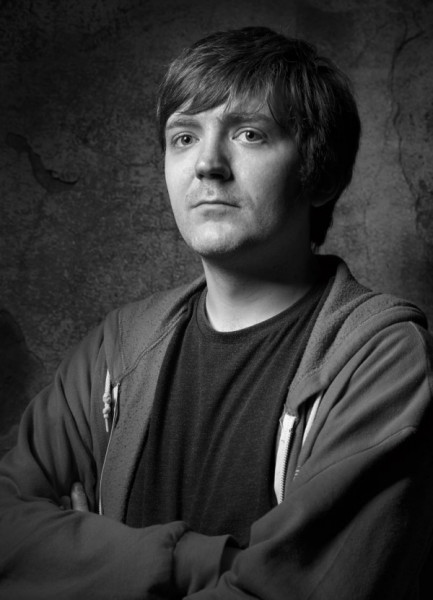
Interview with Dane, a freelance writer and author with 7 published books
How did you get started with remote work?
I had quite an unusual start with remote work. I used to work in social media marketing and so I always knew that I could work remotely, but I didn’t get much of a chance to do it when I was working for somebody else.
I realized after a while that social media marketing isn’t for me, and in fact I only got into it because it involved a certain amount of writing. So when I decided that I wanted to go freelance, it was only logical to look for writing work.
The first ever client that I took on actually came about through Twitter. A chap called Matt Goolding who runs an agency called KYO Digital was looking for someone who could write content about the publishing industry, and I was pretty much the perfect fit. I responded to his tweet, we hopped on a phone call and he ended up becoming my first client.
From there, I moved on to signing up to freelance sites like PeoplePerHour and Upwork, both of which I still use. They take a cut out of your earnings, but as long as you factor that into your hourly rate then it isn’t too much of a problem.
And at the same time, I’ve been building my reputation in general through the work that I do and so now I tend to get a decent amount of work through referrals or from former clients.
Read 114 answers from other remote workers
What are you working on?
I tend to have quite a lot of work on at any given time, so today I’ve worked on maybe a half dozen different projects.
I started the day by writing an article on the biggest myths about digital marketing strategy before moving on to some work I do on a retainer for a US-based company that specializes in lead generation. They build niche lead generation websites for companies in the Boston area, so I work on the website copy for each of the sites they build.
It basically involves researching and writing about the different services that they offer – whether that’s water damage repair or whether it’s for a party bus company – as well as each of the physical areas that they cover.
One of the biggest projects that I’m currently working on is a book that I’ve ghostwritten for a client in the medical field. We’ve been working on it for the best part of a year now and we’re just going through the final few stages ahead of publication. At the moment, it’s on hold while we wait for his proof copy to arrive as we’ve been making a few last minute tweaks to the cover with his cover designer.
Another project I’ve just had the go-ahead for involves taking the transcriptions of some how-to/tutorial videos about some live-streaming software and turning it into an instruction manual.
I also have a few other one-off articles to do for people on the subject of digital marketing, and then there’s some more retained work for a client who’s a bestselling author and who outsources some of her writing work to me. She works as a consultant with a number of other clients and often gets me to help with that, so for example I recently had to create a 20-page “blueprint” out of a 200-page book that just included the most important information.
Read 107 answers from other remote workers
What's your typical work routine?
This is actually something that I’m working on as I don’t really have one. I suffer from anxiety/depression and also have a lot of problems with sleeping, so I don’t really work a 9-5.
Instead, I typically break my work up by getting as much as I can get done during the day while my partner is at work and then I do a little more after she goes to bed.
I quite often end up working evenings/weekends, but the flip-side of that is that if I need to take a mental health day, I can just take it without needing to justify it to a boss.
I tend to find that work comes in waves as well, so I’m always either super busy (as I am at the moment) or I’m relatively free, in which case I can do a little less work and/or focus on all of the admin stuff.
But as a general rule, I work the same amount of hours as I used to work when I was in full-time employment, I just don’t necessarily do it at the same time.
As for my actual process, it’s all pretty simple: I sit down at the computer and write until I’ve finished whatever the deliverable is, and then I read back through it and make any edits that are needed. Then I send it to the client and invoice them before moving on to the next deliverable.
In a good day I can churn out 4-6,000 words. It really depends upon what I have on because some tasks take longer than others. For example, writing SEO copy takes longer because you have to take a lot of time to make sure that you’re using keywords etc.
Read 92 answers from other remote workers
Do you have a dedicated space to work?
Yes and no.
I think my case is a little different to most because I also write books etc. in my own time, so I’m pretty much always working on something.
Because of that, my living room is basically set up as my workspace because after I finish work and my partner comes home, I switch to working on my books.
I’d love to have a dedicated office space, but at the moment I’m locked into a contract in a small studio flat and so there just aren’t enough rooms. It’s actually quite a big problem because I’m paying above average rent just for the location I live in and now that I’m no longer in full-time employment, there’s no reason for me to live here. When the contract runs out in March, the plan is to move out into the countryside where we can get a bigger house for the same price and hopefully a better quality of living.
As for my actual workspace, I basically have a desktop computer plugged into an array of screens. I have my big widescreen TV plugged into a Chromecast that I use to stream content (I watch a lot of YouTube because I take part in the “BookTube” community where people talk about books), and then my computer is plugged into three monitors.
When we move house and I can get an office sorted out, I’ll have all of my bookcases lining the walls (they currently wind throughout the house) and I’ll get an adjustable standing desk. But at the moment, I just sit on the sofa.

Read 93 answers from other remote workers
How do you manage having too much or not enough work?
When I have too much work, I put in extra hours, and when I have too little work, I just spend more time working on my books and my writing. I generally find that I have too much work around 20% of the time, just the right amount 65% of the time and not enough work 15% of the time, so it actually works out quite well.
I also vary how much time I spend pitching for work, so if I know I’m going to be busy for the next few weeks then I won’t pitch for new jobs until that work is coming to a close. But there’s usually a window of maybe a couple of weeks between when I pitch for something and when I’m awarded it, so it can be a bit of a challenge to get it right. A lot of it is just trial and error.
Read 18 answers from other remote workers
What tools do you use to stay productive?
As far as freelancing sites go, I use Upwork and PeoplePerHour. I also have a website and my portfolio is on SlideShare, which helps to give it a little extra exposure. And I sometimes get leads through my social media presences as well, predominantly from LinkedIn and Twitter.
Other tools that I use quite a lot include Dropbox and Google Docs for storing and sharing files, Slack and Skype for communication and occasionally Trello for project management.
I spend a lot of time in WordPress admin panels as well. But it really depends upon the client, and I’m generally quite flexible about what I use. All I actually need to write copy is Microsoft Word to write it in and Google Chrome to carry out a little research and to find sources.
Read 108 answers from other remote workers
How do you stay on task?
When you work in a creative job, I think you need to take regular breaks so that you can recharge.
That’s particularly true if you’re stuck on something, because I tend to find that as soon as I stop worrying about a problem, a solution presents itself.
Another option is to hop from one task to another, which is what I’ve always done to deal with “writer’s block”. I’m not sure that I’ve ever really had writer’s block anyway, or even that it exists. Every time I’ve ever been stuck with something, I’ve just switched tack and worked on a different project for a while and then when I return to whatever I was stuck with, I’m good to go.
Another thing that I’m quite good at is multitasking, and while I don’t necessarily do that while working on client projects (unless there’s a need to do so), it does come in handy for admin tasks. I’ll quite often be responding to emails whilst simultaneously working on job proposals or updating my website. I’ve been doing that for years though, so perhaps it’s not the best idea for everyone.
Other than that, all I really need is my trusty to-do list. I use it to plan my work out based on how long I think tasks are going to take and then I just make sure that I stay on top of it.
I actually think that one of the best ways to stay productive is to make sure that you’re always organized.
And having a clean and tidy working environment helps, too.
Read 100 answers from other remote workers
What do you like about remote work?
Honestly, working remotely just came about because I wanted to switch my day job from social media marketing to flat out writing.
What I like most about my job is the fact that I can pick and choose which projects to bid for and to work on.
I don’t just have to do whatever I’m told to by some line manager who has no idea where my strengths lie and what I want to get out of life. Being able to “fire” clients when they’re frustrating or unprofitable is nice, too.
Another big advantage is the fact that I can pick my own hours and take time off as and when needed. For example, earlier this year I was given the opportunity to go to Latvia on a last minute press trip to learn more about the Latvian literature scene and to help to promote it through my blog and my YouTube channel. Because it was so last minute (we’re talking a few days’ notice), there’s no chance I would have been “allowed” to go if I was in full-time employment. But because I’m my own boss, I was able to do it.
I think one of the main things that it comes down to is flexibility. Working in a corporate environment can be stifling, even though the companies that I worked for previously would be considered SMEs at best. Still, I’ve never been a fan of office politics and the inflexibility of having multiple line managers etc. and find that now that I work remotely, I can react much more quickly to client requests and just generally do my job more effectively.

Read 106 answers from other remote workers
What do you not like about remote work?
When I left my old job to go full-time freelance, I used to joke with people that I was trading all of my colleagues for a single cat – and that the cat would be more useful to have around. I’d heard a lot of people talking about how freelancing can get lonely but I’d never paid too much attention because I like my own company anyway and tend to get more done when I’m alone because I’m not being stopped every five minutes and asked for favours.
Still, perhaps I should have listened some more because it does get lonely sometimes and it also means that I spend a lot of time indoors. I often go a few days without going outside, and most of the time I don’t even realize it.
I’m also not particularly happy with my current living situation, but I’m trapped in a contract here until March and so I’m pretty much making the best of a bad job until we can move out to somewhere with a little more space. And hopefully a garden so that at least I can take my laptop and go and work outside.
Maintaining a work/life balance isn’t easy either, although it’s something that I’m working on and getting better at. But despite the cons, I don’t think I could go back to working for someone else because the advantages outweigh the disadvantages and I value the freedom that remote work gives to me.
Read 103 answers from other remote workers
How does working on your own projects help your freelance work?
I was actually having a similar discussion with a client of mine who I’m ghostwriting a book for.
Essentially, I had to make sure that he had realistic expectations by explaining that it’s unlikely that his book will sell particularly well and that it certainly won’t pay for itself in terms of how much it’s cost for us to release it. I’ve written seven books and do okay for an indie writer, but the royalties on them don’t even cover the cost of my editor, my layout guy and my cover designer.
The real value of writing books comes in terms of the authority that it gives you.
In my case it allows me to charge a higher freelance rate because I have proven experience and a body of readers who enjoy my work.
For my client, it’ll open up keynote speaking opportunities and lead to potential new consulting work. So in a way, the books do pay for themselves – just not directly.
I suspect that much the same holds true for other creative industries. For example, if you’re a film-maker and you release a full-length movie, at best you might be able to monetise it with advertisements on YouTube. But having that full-length movie in your portfolio is going to look great and dramatically increase the chances that people will be willing to pay your rates.
Read 9 answers from other remote workers
What did we forget to ask Dane Cobain?
At RemoteHabits we're always trying to improve our interviews, what question should we have asked Dane Cobain?
Biography
Dane Cobain
Dane Cobain is a published author and freelance writer from Buckinghamshire, UK.
Specialising in marketing, publishing and technology, when he's not writing for his clients he can usually be found writing for himself or talking about books on YouTube. Find out more at www.dane-writes.com or email him.
Work remotely? Share your story on RemoteHabits!
Want to be interviewed? If you have a remote position, head over to the interview me page!
Looking for a remote job?
RemoteHabits Jobs has everything you need to find your next great remote work position!
Related Interviews
Interview with Pamela, a travel writer adjusting to freelancing
Pamela is new to the world of freelancing. In this interview, she shares the ups and downs of adjusting to the gig economy.
Interview with Erin, a virtual assistant with a successful approach to freelancing
Erin has found freelancing success as a virtual assistant—see her organizational tips & insights into how she picks clients that suit her business.
Interview with Mike, a software engineer who works remotely at GitHub
Mike got started with remote work after getting an offer from his dream organisation. Learn how he works remotely while working on open source projects and publishing books.


